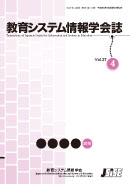
- 4 号 p. 299-
- 3 号 p. 241-
- 2 号 p. 153-
- 1 号 p. 1-
- |<
- <
- 1
- >
- >|
-
松居 辰則2010 年27 巻4 号 p. 299-301
発行日: 2010年
公開日: 2018/07/28
ジャーナル フリーPDF形式でダウンロード (276K)
-
小島 一晃, 三輪 和久, 松居 辰則2010 年27 巻4 号 p. 302-315
発行日: 2010年
公開日: 2018/07/28
ジャーナル フリーIn learning of problem posing, it is important but difficult for learners to generate diverse problems by associating and combining various situations expressed in problem texts and mathematical structures of solutions. To design supporting methods for expanding the variety of problems, it is crucial to understand the types of problems that learners have difficulty in posing, and to draw crucial elements to facilitate diverse problem posing. We conducted an experimental investigation to obtain the empirical data of the variety of mathematical word problems posed by novice participants. The participants were asked to pose new problems from given examples. The experimental results indicated that the participants posed only a few problems that had situations identical to and solutions different from the examples. It was also revealed that problems that the participants constructed based on their own ideas had relatively simple and inappropriate solution structures. Those results suggest that idea generation support for constructing solution structures of problems is effective in expanding the variety of problem posing. According to these findings, we discussed approaches to support the learning of problem posing.
抄録全体を表示PDF形式でダウンロード (857K) -
角田 雅照, 秋永 知宏, 引地 一将, 大杉 直樹, 柿元 健, 門田 暁人, 松本 健一2010 年27 巻4 号 p. 316-326
発行日: 2010年
公開日: 2018/07/28
ジャーナル フリーIt is important for software engineers to improve their skills by self-learning existing software development techniques. However, it is not easy for engineers to find out which techniques should be learned because there are so many existing techniques and also new techniques are emerging continuously. To support software engineers’ self-learning, we propose a development technique recommendation method using collaborative filtering (CF). In our method, a user (engineer) gives ratings to development techniques based on his/her interest or benefit, then development techniques are recommended based on similarity measure of CF. The similarity is computed based on co-occurrence of terms of development techniques on web pages. We conducted an experiment to evaluate the recommendation accuracy of the proposed method. As a result, the average NDPM was 0.41 for recommending development techniques that are unfamiliar to software engineers.
抄録全体を表示PDF形式でダウンロード (1287K)
-
布施 泉, 岡部 成玄2010 年27 巻4 号 p. 327-336
発行日: 2010年
公開日: 2018/07/28
ジャーナル フリーWe discuss how to use teaching materials of video and manga in computer ethics education of universities. The features of those teaching materials and the learning effect by using them are also discussed. In 2009, some of the video teaching materials are converted to manga version, and those mangas were used before and after the video watching in the education of Hokkaido University. It is found that the learners were interested in the way of using both video and manga during the course of learning. The learning effect was also shown up by their repetition study. It was clarified that the teaching material that the learner wanted to learn first depended on the difficulty of the learning item and learner’s learning style.
抄録全体を表示PDF形式でダウンロード (1016K)
-
2010 年27 巻4 号 p. 337-342
発行日: 2010年
公開日: 2018/07/28
ジャーナル フリーPDF形式でダウンロード (1879K)
- |<
- <
- 1
- >
- >|